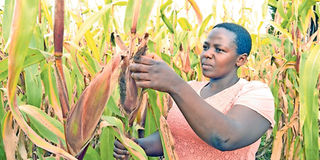Brief news on farming and agribusiness developments from around the region

A farmer inspects maize in her farm. Researchers have developed more than 20 high-yielding and drought-resistant maize varieties. FILE PHOTO | NMG
What you need to know:
- During a field day attended by officials from seed companies on Wednesday, Mr James Karanja, a plant breeder from Kenya Agricultural and Livestock Research Organisation, said the hybrids are also tolerant to maize lethal necrosis disease.
- During the just concluded Sustainable Blue Economy Conference in Nairobi, Ms Amina Juma Hamza, a scientist at Kenya Marine and Fisheries Research Institute, said conservation of carbon ecosystems, specifically mangroves can become a business through carbon credit trading.
- Kisii Agriculture, Livestock, Fisheries and Co-operative Development executive Esman Onsarigo said 10 cows have died from rabies.
Researchers develop high-yielding drought resistant maize varieties.
Researchers have developed more than 20 high-yielding and drought-resistant maize varieties.
During a field day attended by officials from seed companies on Wednesday, Mr James Karanja, a plant breeder from Kenya Agricultural and Livestock Research Organisation, said the hybrids are also tolerant to maize lethal necrosis disease.
He said the purpose of the visit was to show the companies the available varieties to enable them to pick them, multiply the seeds and make them available in the market.
“Drought has been a serious concern and together with others, we have developed drought-resistant varieties with fairly high yields,” Mr Karanja said.
He said farmers would be able to access the seeds in the coming two years, adding that some companies have already picked them.
He added that the hybrid has been tested under different ecological zones.
-Macharia Mwangi
****
Scientist urges Kenyans at the coast region to take up mangrove farming
Kenyans in the coastal region have been advised to take up mangrove farming as a conservation measure and a source of income.
Mangroves store carbon in the soil and tame the effects of climate change.
During the just concluded Sustainable Blue Economy Conference in Nairobi, Ms Amina Juma Hamza, a scientist at Kenya Marine and Fisheries Research Institute, said conservation of carbon ecosystems, specifically mangroves can become a business through carbon credit trading.
She gave the example of Mikoko Pamoja project in Kwale which generates Sh1,846,800 annually through carbon credit trading.
Despite mangroves naturally occurring on Kenya’s 600 kilometre coastline, in some areas like Lamu and Kwale, community-based groups co-manage the forests with government agencies.
“Mangroves are valued both for their harvestable and other products,” Ms Hamza said.
-Bernadine Mutanu
****
Kisii County in drive to vaccinate pets after an outbreak of rabies
The Kisii County government has begun vaccinating pets against rabies following an outbreak in some parts of the region.
The programme, which targets more than 6,000 pets is ongoing in Bonchari, Kitutu Chache South, Nyaribari Chache and Bobasi sub counties where 10 cases of the zoonotic disease have been reported in the past few days.
Residents have been urged to take their cats and dogs for the vaccination, which will be in all counties.
Kisii Agriculture, Livestock, Fisheries and Co-operative Development executive Esman Onsarigo said 10 cows have died from rabies.
“We have taken measures to contain the outbreak and we urge farmers to co-operate with us,” Mr Onsarigo said.
He added that routine vaccination of animals against foot and mouth disease is ongoing.
“We are taking preventive measures against this disease. The exercise targets more than 40,000 animals,” he said.





